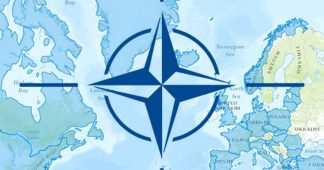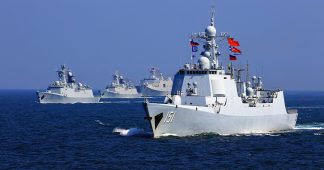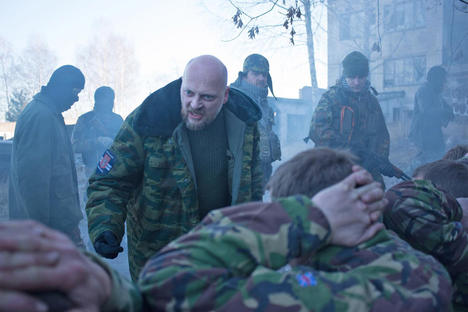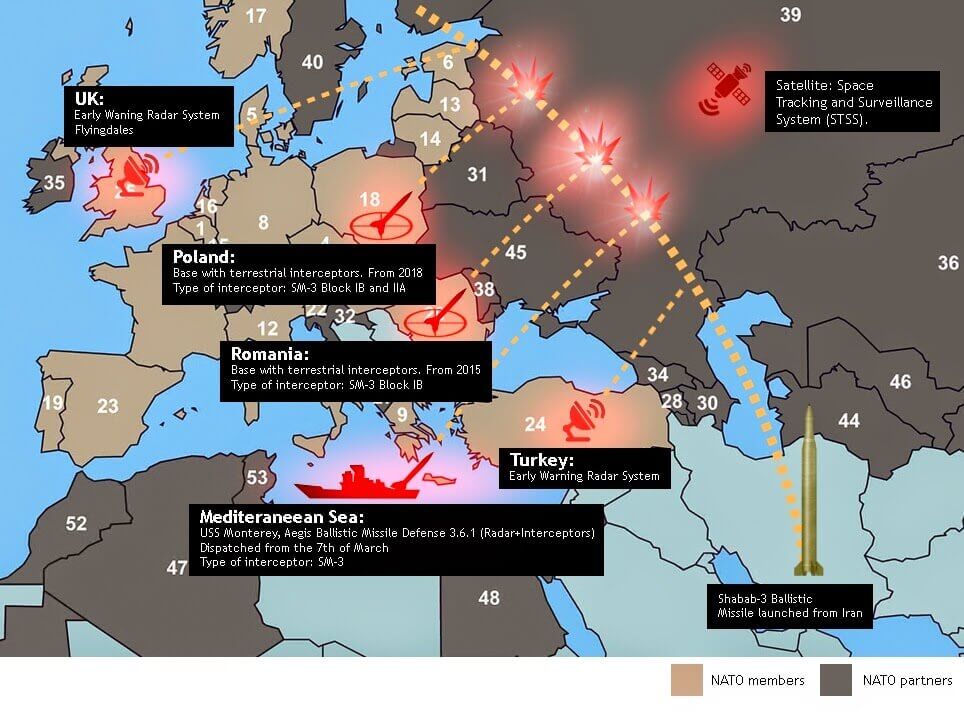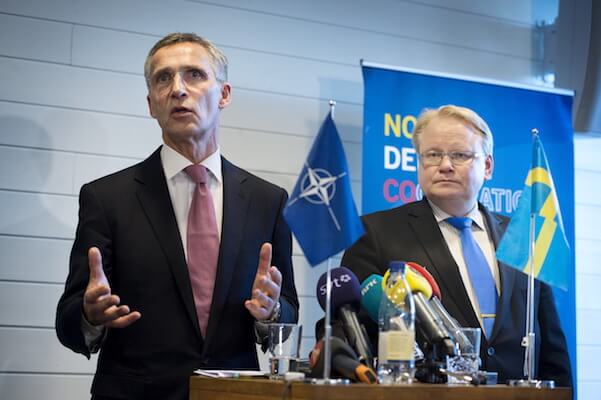by Svetlana Savranskaya and Tom Blanton
Mar 16, 2018
Russian president led to believe Partnership for Peace was alternative to expanded NATO
Documents show early Russian opposition to “neo-containment;” more U.S. assurances to Russia: “inclusion not exclusion” in new European security structures
Washington, D.C., March 16, 2018 – Declassified documents from U.S. and Russian archives show that U.S. officials led Russian President Boris Yeltsin to believe in 1993 that the Partnership for Peace was the alternative to NATO expansion, rather than a precursor to it, while simultaneously planning for expansion after Yeltsin’s re-election bid in 1996 and telling the Russians repeatedly that the future European security system would include, not exclude, Russia.
The declassified U.S. account of one key conversation on October 22, 1993, (Document 8) shows Secretary of State Warren Christopher assuring Yeltsin in Moscow that the Partnership for Peace was about including Russia together with all European countries, not creating a new membership list of just some European countries for NATO; and Yeltsin responding, “this is genius!”
Christopher later claimed in his memoir that Yeltsin misunderstood – perhaps from being drunk – the real message that the Partnership for Peace would in fact “lead to gradual expansion of NATO”;[1] but the actual American-written cable reporting the conversation supports subsequent Russian complaints about being misled.[2]
Christopher wondered afterwards (according to his memoir, pp. 280-281) whether the Russian foreign minister, Andrei Kozyrev, had deliberately failed to alert Yeltsin about the inevitability of NATO expansion, or whether Yeltsin was just relieved that NATO expansion would not be immediate – or whether Yeltsin was just having “a bad day.” But Christopher had told Kozyrev himself earlier that day, according to the U.S. declassified cable (Document 7), that there would be “no predetermined new members” in NATO, and “we’re emphasizing the Partnership for Peace” is “open to all.”
The Strobe Talbott account of the October 22nd meeting with Yeltsin is more detailed and nuanced than Christopher’s, but also leaves the impression that Yeltsin heard only what he wanted to hear, somehow not letting the Americans explain that the real message was “PFP today, enlargement tomorrow.”[3] “Yeltsin welcomed us looking like a stunned bull” and delivered a “long, barely coherent boast” before interrupting Christopher’s presentation on NATO and PFP (“Without letting Chris finish…”). Christopher’s actual words to Yeltsin, at the end of the meeting, were that the U.S. would be “looking at the question of membership as a longer term eventuality.”
Documents from the Russian side show opposition to NATO expansion across the political spectrum, dating back to a Yeltsin supporters’ meeting with NATO Secretary General Manfred Woerner in the summer of 1991 (he assured them expansion would not happen), and forward to the large majority of Duma deputies from every political party joining the anti-NATO caucus in 1996. As the U.S. chargé d’affaires in Moscow, James Collins, warned Secretary of State Christopher just before his trip to meet Yeltsin in October 1993 (Document 6), the NATO issue “is neuralgic to the Russians. They expect to end up on the wrong side of a new division of Europe if any decision is made quickly. No matter how nuanced, if NATO adopts a policy which envisions expansion into Central and Eastern Europe without holding the door open to Russia, it would be universally interpreted in Moscow as directed against Russia and Russian alone – or ‘neo-containment’….”
Yeltsin himself had set off wide discussion of possible NATO expansion with his public remarks in Warsaw in August 1993, where he acknowledged the Helsinki Final Act right of countries to choose their alliances, and “seemed to give a ‘green light’ to NATO expansion.” (See Document 5, Tab C “NATO Expansion: Eastern and Allied Views”)
The U.S. “green light” document notes that almost immediately, however, Moscow got “busy ‘refining’ its position.” Yeltsin’s letter to Clinton on September 15, 1993, (Document 4) expressed “uneasiness” over the discussion of “quantitative expansion” and strongly advocated “a pan-European security system” instead of NATO. Yeltsin warned, “Not only the opposition, but moderate circles as well [in Russia], would no doubt perceive this as a sort of neo-isolation of our country in diametric opposition to its natural admission into Euro-Atlantic space.” Yeltsin also argued “the spirit” of the German unification treaty “precludes the option of expanding the NATO zone into the East” (citing the provisions preventing non-German NATO troops from being stationed on the former East German territory). This paragraph was the only one in the Yeltsin letter highlighted for Strobe Talbott by a staff expert on Russia/Ukraine, Steve Pifer.
The declassified U.S. record includes new evidence on internal American thinking, such as a specific calendar for expansion in one early September 1993 document from the State Department (see Document 2), up to and including the ultimate admission of Ukraine, Belarus, and Russia to NATO in 2005, after the Central and Eastern Europeans and the Baltics. But Yeltsin’s September 15 letter contributed to intense debates on the American side, including the Defense Department rejection of the State Department’s calendar, leading to the Partnership for Peace idea rather than explicit NATO expansion in the fall of 1993. One October 5, 1993, document (Document 5) summarized the debate as between the “State approach to NATO expansion” or the Office of the Secretary of Defense approach, “partnership for peace with general link to membership,” and the latter became Christopher’s presentation to Yeltsin on October 22: partnership for all, not membership for some.
In January 1994, President Clinton told Yeltsin in Moscow that the Partnership for Peace was “the real thing now.” On the way to Moscow, Clinton delivered the famous “not whether but when” speech in Prague, which would be seized on by NATO expansion proponents in the Clinton administration to win the internal debate.[4] The declassified memcons of Clinton’s Prague meetings with the leaders of the Czech Republic, Poland, Hungary, and Slovakia show the American president arguing for the Partnership for Peace as a “track that will lead to NATO membership” and that “does not draw another line dividing Europe a few hundred miles to the east.” (See Document 11) Clinton candidly admitted to Vaclav Havel “there is no consensus now among NATO allies to extend formal security guarantees” because of uncertainty about which countries could contribute, and because “the reaction in Russia could be the reverse of what we want.”
Polish President Lech Walesa told Clinton (Document 12): “Russia had signed many agreements, but its word was not always good: one hand held a pen; the other a grenade. Yeltsin told the Poles in Warsaw last summer that Russia had no objection to Poland’s membership in NATO; he, Walesa, had a paper with Yeltsin’s signature to prove it. But Yeltsin had changed his mind. The Visegrad countries here represented, Walesa continued, kept their word; they had a Western culture. Russia did not.” Czech President Vaclav Havel immediately responded, “it was neither possible nor desirable to isolate Russia.”
The Americans kept trying to reassure Yeltsin. Quotations from President Clinton’s face-to-face conversations with Yeltsin in 1994, particularly September 27, 1994, at the White House, show Clinton “emphasizing inclusion, not exclusion …. NATO expansion is not anti-Russian; it’s not intended to be exclusive of Russia, and there is no imminent timetable…. the broader, higher goal [is] European security, unity and integration – a goal I know you share.”[5]
But the Russians were hearing in the fall of 1994 that new Assistant Secretary of State for Europe Richard Holbrooke was speeding up NATO expansion discussions, even initiating a NATO study in November of the “how and why” of new members. Yeltsin protested with a letter to Clinton on November 29, 1994, (Document 13) that emphasized Russia’s hopes for the Conference on Security and Cooperation in Europe (CSCE) as a “full-fledged all-European organization” and complained, “one completely fails to understand the reasons behind a new revitalizing of the discussion on speeding up the broadening of NATO.”
On December 1, Foreign Minister Kozyrev unexpectedly refused to sign up for the Partnership of Peace; and on December 5, Yeltsin lashed out about NATO at the Budapest summit of the CSCE, in front of a surprised Clinton: “Why are you sowing the seeds of mistrust? … Europe is in danger of plunging into a cold peace …. History demonstrates that it is a dangerous illusion to suppose that the destinies of continents and of the world community in general can somehow be managed from one single capital.”[6]
The dismayed Americans began to understand that Russia had concluded the U.S. was “subordinating, if not abandoning, integration [of Russia] to NATO expansion.” (See Document 17) Washington dispatched Vice President Al Gore to Moscow to patch things up, using the existing Gore-Chernomyrdin Commission’s scheduled meetings as the venue. Gore’s talking points for his meeting with Yeltsin (in the latter’s hospital room) (Document 16) and the Russian record of Gore’s meeting with Duma Speaker Ivan Rybkin on December 14, 1994, (Document 14) show the Americans emphasizing there would be no rapid NATO expansion, only a gradual, deliberate process with no surprises, moving in tandem with the “closest possible understanding” between the U.S. and Russia, and no new NATO members in 1995, a year of Russian parliamentary elections.
Gore later told the Belgian prime minister that “Yeltsin was prepared to acquiesce to the basic truth that NATO would expand.” A March 1995 U.S. cable reports, “In a conversation with Yeltsin in his hospital room, the Vice President explained that the NATO-Russia relationship was analogous to the docking of the space shuttle with the Mir space station, which had to match orbits and speeds to come together. Yeltsin had agreed, but noted that in such delicate maneuvers, sudden motions could be dangerous.”[7]
Yeltsin showed only limited acquiescence when Clinton came to Moscow in May 1995 to mark the 50th anniversary of victory over Hitler in World War II. The U.S. memcon of the one-on-one meeting at the Kremlin (Document 19) features repeated Yeltsin objections: “I see nothing but humiliation for Russia if you proceed …. Why do you want to do this? We need a new structure for Pan-European security, not old ones! …. But for me to agree to the borders of NATO expanding towards those of Russia – that would constitute a betrayal on my part of the Russian people.” For his part, Clinton insisted that “gradual, steady, measured” NATO expansion would happen: “You can say you don’t want it speeded up – I’ve told you we’re not going to do that – but don’t ask us to slow down either, or we’ll just have to keep saying no.” Clinton also assured Yeltsin, “I won’t support any change that undermines Russia’s security or redivides Europe,” and urged Yeltsin to join the Partnership for Peace. At the end, the two leaders agreed that any NATO expansion would be delayed until after the 1996 Presidential elections (in both countries).
At the Clinton-Yeltsin meeting in June 1995 at Halifax, Nova Scotia (Document 20), Clinton applauded the Russian agreement finally to join PFP, and recommended more military-to-military cooperation and more Russia-NATO dialogue. The Russian leader had kind words for the American president: “I myself and the Russian leadership have no doubt about our partnership. We’ll build the partnership on the basis of our friendship, yours and mine, and we’ll do so for the sake of world peace.” Then Yeltsin reiterated, “we must stick to our position, which is that there should be no rapid expansion of NATO;” and he went on to argue, “it’s important that the OSCE be the principal mechanism for developing a new security order in Europe. NATO is a factor, too, of course, but NATO should evolve into a political organization.”
The Russian declassified documents from closed Duma hearings (Document 18) and internal memos in the 1990s (Document 25) detail the Russian objections that NATO expansion would (1) threaten Russian security, (2) undermine the idea of inclusive European security that Gorbachev and Yeltsin both sought, and (3) draw a new line across Europe. The record of early and vehement Russian objections, including Yeltsin’s multiple remonstrances to Clinton, tends to support Collins’ analysis from October 1993 and to undercut a claim in recent scholarly literature that Russian complaints about NATO expansion are more a function of today’s “memory politics” than “what really happened in 1990 and beyond.”[8]
Today’s posting includes, in translation, one of the earliest Russian compilations of Western assurances against NATO expansion during and after the German unification discussions of 1990, put together by new Foreign Minister Yevgeny Primakov in January 1996, described in his subsequent memoir in 2006, and published in some detail in his 2015 book. (Document 22) Also published in English for the first time is Primakov’s summary for the head of the Duma in early 1997 about the threat of NATO expansion to Russian security interests, just prior to the NATO summit that would announce the invitations to Poland, the Czech Republic, and Hungary to join NATO. The Primakov documents speak to the fundamental Moscow understanding of the end-of-the-Cold-War arrangements, that Germany would unify in NATO in 1990 only with the inclusion of the USSR (and then Russia) in subsequent European security structures.[9]
The Primakov compilation of Western assurances to Gorbachev may have provided the catalyst for a forceful State Department rebuttal sent to all European posts in February 1996 (Document 23), after then-Ambassador Collins reported that a “senior Kremlin official” was complaining that NATO expansion would violate the “spirit” of the German unification treaty (just as Yeltsin had argued in his September 15, 1993, letter to Clinton). The February 23rd cable transmitted a memo written by Acting Assistant Secretary of State for Europe John Kornblum, together with John Herbst, then at State’s office on the Newly Independent States (NIS) and a future ambassador to Ukraine, characterizing the Russian claims as “specious” and “unfounded.” This memo seems to have provided some basis for State and NATO talking points ever since in addressing Russian complaints about NATO expansion.[10]
The Kornblum-Herbst memo focused on the Two-Plus-Four negotiations that developed the German unification treaty, arguing that the treaty only applied to the territory of the former East Germany, and provided no precedent for limits on any new NATO members. The memo inaccurately described one comment by Hans-Dietrich Genscher as “unilateral” and only applying to the former GDR, when in fact State Department and British diplomatic cables at the time (February 1990) showed Genscher specifically and repeatedly referred both to the former GDR and to Poland and Hungary as countries that might want to join NATO. But otherwise, the memo did not address the high-level assurances about Soviet security (such as “not one inch eastward”) provided to Gorbachev by a wide range of Western leaders (James Baker, Helmut Kohl, Douglas Hurd, John Major, and George H.W. Bush, among others).[11]
The Kornblum-Herbst memo contained one confusing reference, supposedly citing the “senior Kremlin official,” to “legally binding declarations by Eastern European leaders” at the time. Neither State’s intelligence bureau nor its historian’s office could find such declarations, perhaps because the Russians were actually referring to Western leader assurances, or even to the famous Vaclav Havel speech to a joint session of the U.S. Congress in February 1990 calling for dissolution of both blocs (he soon changed his mind).[12]
Today’s posting does not address the undeniable benefits to the Central and Eastern European countries of integration into NATO – although some of these were articulated by their leaders in the memcons with President Clinton in January 1994 that are published here. Nor does the posting provide any net assessment of the gains and losses to American and European security from NATO expansion. Rather, the focus of this collection of documents is simply on what Russian President Boris Yeltsin heard from the Clinton administration about NATO expansion in the first half of the 1990s, and on the repeated Russian objections that were just as repeatedly discounted by Clinton administration officials.
The National Security Archive initially compiled these declassified documents for a panel discussion on November 10, 2017, at the annual conference of the Association for Slavic, East European and Eurasian Studies (ASEEES) in Chicago under the title “Who Promised What to Whom on NATO Expansion?” The panel included:
* Mark Kramer from the Davis Center at Harvard, editor of the Journal of Cold War Studies, whose 2009 Washington Quarterly article argued that the “no-NATO-expansion pledge” was a “myth”;
* Joshua R. Itkowitz Shifrinson from the Bush School at Texas A&M, whose 2016 International Security article argued the U.S. was playing a double game in 1990, leading Gorbachev to believe NATO would be subsumed in a new European security structure, while working to ensure hegemony in Europe and the maintenance of NATO;
* James Goldgeier from American University, who wrote the authoritative book on the Clinton decision on NATO expansion, Not Whether But When, and described the misleading U.S. assurances to Russian leader Boris Yeltsin in a 2016 WarOnTheRocks article;
* Svetlana Savranskaya and Tom Blanton from the National Security Archive, whose most recent book, The Last Superpower Summits: Gorbachev, Reagan, and Bush: Conversations That Ended the Cold War (CEU Press, 2016) analyzes and publishes the declassified transcripts and related documents from all of Gorbachev’s summits with U.S. presidents, including dozens of assurances about protecting the USSR’s security interests and including the Soviets in the post-Cold War European security structure.
You can read the documents here
Also read:All Western leaders were lying, promising not to expand NATO
Published at https://nsarchive.gwu.edu/briefing-book/russia-programs/2018-03-16/nato-expansion-what-yeltsin-heard
